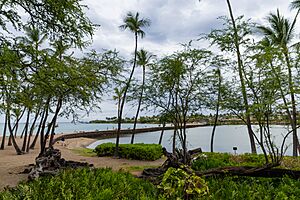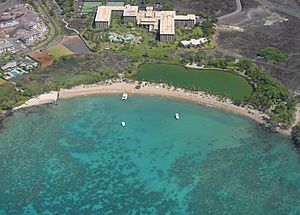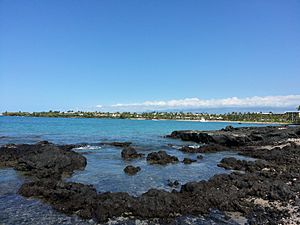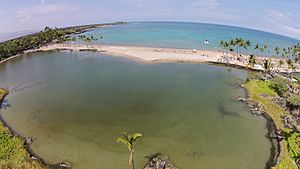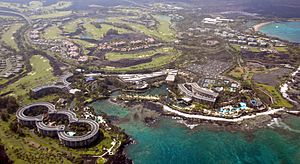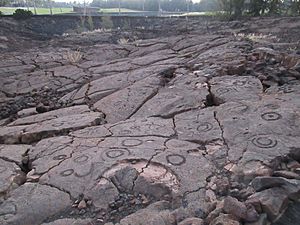Waikoloa Beach facts for kids
Waikoloa Beach is a beautiful area on the Big Island of Hawaii, located along the sunny South Kohala coast. It's sometimes confused with Waikoloa Village, which is nearby. This special place is full of amazing natural wonders and important historical sites from ancient Hawaiian culture. You can find old fishponds, unique water pools, and mysterious rock carvings here.
Contents
The Ancient King's Trail
The Ala Kahakai, which means "trail by the sea," is an ancient pathway that runs along the coast of Waikoloa. Imagine it as an old highway that connected important Hawaiian villages, temples, and fishing spots. This trail is about 175 miles (280 km) long and is often called the "King's Trail." It shows how Hawaiians traveled and connected with each other long ago.
Discover Anaehoomalu Bay (A-Bay)
ʻAnaehoʻomalu Bay, often called A-Bay, is a stunning beach with lots of palm trees and calm, shallow water. It's on the South Kohala coast of the Big Island. A-Bay is famous for its incredible sunsets, great snorkeling, and historic royal fishponds. The closest town is Waikoloa Village.
This bay is a hub for water fun! You can rent snorkeling gear, go on glass-bottom boat tours, or try paddleboarding, kayaking, and hydro bikes. It's also where the Waikoloa canoe club practices.
Unique Anchialine Ponds
Waikoloa is home to special water pools called anchialine ponds. These ponds are a mix of fresh water from rain and salty ocean water, creating a unique environment. In 1985, the Waikoloa Anchialine Pond Preservation Area was created to protect them. These ponds are like mini-ecosystems, perfect for small fish, crabs, snails, and tiny red shrimp. They are an important part of Hawaiian culture and nature.
Ancient Fishponds: Kuʻualiʻi and Kahapapa
Right behind Waikoloa Beach in Anaehoʻomalu Bay, you'll find the Kuʻualiʻi and Kahapapa Fishponds. Long ago, Anaehoʻomalu was a very important place for aquaculture, which is like farming fish. These two ponds were part of a larger system of fish farms that ancient Hawaiian people carefully managed to raise fish for food. It shows how smart and connected to nature they were.
The Hilton Waikoloa Village Resort
The Hilton Waikoloa Village is a huge resort built on 62 acres (25 hectares) of land. It has many rooms and suites, surrounded by beautiful tropical gardens, waterfalls, and lagoons. The resort also has tennis courts, amazing artworks, and statues.
This resort has been a popular spot for famous events! The game show Wheel of Fortune has filmed episodes here several times. It was also the setting for the Nickelodeon game show Paradise Run and hosted the Pokémon World Championships in 2007, 2010, and 2012. A spot called "Buddha Point" at the resort is a favorite place to watch the sunset.
Mysterious Petroglyphs
Waikoloa is home to about 30,000 historically important petroglyphs, which are carvings made on rocks. These carvings are perhaps the closest thing to a written language that ancient Hawaiians used. Some petroglyphs clearly show human or animal shapes, while many others are more abstract and mysterious, with their meanings lost to time. Most of these carvings were made between the 1400s and 1700s. You can also find messages from visitors in the 1800s, written in the modern Hawaiian language, mixed in with the older drawings.
 | William L. Dawson |
 | W. E. B. Du Bois |
 | Harry Belafonte |


